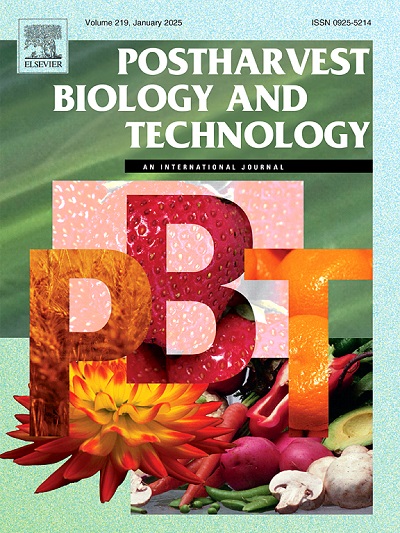Exploring the biocontrol performance of Bacillus velezensis against postharvest diseases of eggplants and the underlying action mechanisms in soft rot management
IF 6.4
1区 农林科学
Q1 AGRONOMY
引用次数: 0
Abstract
Postharvest eggplants are highly vulnerable to pathogen invasion, which results in quality deterioration and economic losses. Previous research has shown that Bacillus velezensis significantly reduced the soft rot occurrence of eggplants through producing cyclic lipopeptides and improving reactive oxygen species (ROS) scavenging capability of eggplants. In the present study, the mechanisms involved in soft rot management by B. velezensis were explored in depth, and a broad-spectrum biocontrol efficacy of this antagonistic bacterium against other major postharvest diseases of eggplants was further investigated. The results exhibited that B. velezensis has the ability to inhibit critical postharvest pathogens of eggplants, including Botrytis cinerea and Alternaria alternate. More importantly, this antagonistic bacterium decreased natural decay rate of eggplants from 72.25 % to 31.5 %. It suggested that this antagonist possessed extensive control effectiveness against primary diseases of postharvest eggplants. The effective biofilm formation of B. velezensis facilitated its colonization on fruit, which contributed to the biocontrol of postharvest diseases in eggplants. The exploration based on biochemical and transcriptomic analysis revealed that B. velezensis application resulted in the up-regulation of genes involved in Ca2+ signaling, plant hormone signaling, and bacterial AvrRpt2-mediated signaling in eggplants. Further, it triggered the expression of important genes involved in ROS scavenging and other defense responses, and boosted the activities of key defensive enzymes. Besides, B. velezensis application activated the genes involved in synthesizing resistance-associated secondary metabolites, such as lignins, flavonoids and anthocyanins, which align with the increased accumulation of these metabolites observed in eggplants. Collectively, the resistance against soft rot was stimulated in eggplants. This study offers valuable insights into the complex mechanisms by which antagonists like B. velezensis control postharvest diseases of eggplants and paves the way for developing strategies to control postharvest diseases in eggplants.
探讨velezensis对茄子采后病害的生物防治效果及其在软腐病防治中的作用机制
茄子采后易受病原菌侵袭,造成品质恶化和经济损失。已有研究表明,velezensis通过产生环脂肽,提高茄子清除活性氧(reactive oxygen species, ROS)的能力,显著减少了茄子软腐病的发生。本研究深入探讨了velezensis管理茄子软腐病的机制,并进一步研究了该拮抗菌对茄子其他主要采后病害的广谱生物防治效果。结果表明,velezensis对茄子采后关键病原菌番茄葡萄孢菌(Botrytis cinerea)和交替孢霉(Alternaria alternate)具有抑制作用。更重要的是,这种拮抗细菌使茄子的自然腐烂率从72.25% %降低到31.5 %。表明该拮抗剂对茄子采后原发病害具有广泛的防治效果。白僵菌有效的生物膜形成有利于其在果实上定植,有助于茄子采后病害的生物防治。基于生化和转录组学分析的探索发现,使用B. velezensis导致茄子Ca2+信号通路、植物激素信号通路和细菌avrrpt2介导的信号通路相关基因上调。此外,它触发了参与ROS清除和其他防御反应的重要基因的表达,并提高了关键防御酶的活性。此外,白僵菌激活了与抗性相关的次生代谢物(如木质素、黄酮类和花青素)合成相关的基因,这与在茄子中观察到的这些代谢物积累增加相一致。总的来说,提高了茄子对软腐病的抗性。本研究为了解茄子采后病害防治机制提供了有价值的见解,为制定茄子采后病害防治策略奠定了基础。
本文章由计算机程序翻译,如有差异,请以英文原文为准。
求助全文
约1分钟内获得全文
求助全文
来源期刊

Postharvest Biology and Technology
农林科学-农艺学
CiteScore
12.00
自引率
11.40%
发文量
309
审稿时长
38 days
期刊介绍:
The journal is devoted exclusively to the publication of original papers, review articles and frontiers articles on biological and technological postharvest research. This includes the areas of postharvest storage, treatments and underpinning mechanisms, quality evaluation, packaging, handling and distribution of fresh horticultural crops including fruit, vegetables, flowers and nuts, but excluding grains, seeds and forages.
Papers reporting novel insights from fundamental and interdisciplinary research will be particularly encouraged. These disciplines include systems biology, bioinformatics, entomology, plant physiology, plant pathology, (bio)chemistry, engineering, modelling, and technologies for nondestructive testing.
Manuscripts on fresh food crops that will be further processed after postharvest storage, or on food processes beyond refrigeration, packaging and minimal processing will not be considered.
 求助内容:
求助内容: 应助结果提醒方式:
应助结果提醒方式:


